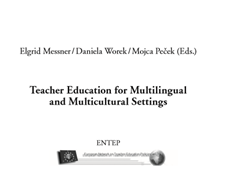The European Network on Teacher Education (in addition ENTEP) collection can be considered as response to challenges of increased cultural and linguistic diversity in classrooms. It represents a series of significant contributions by several European experts who are either official ENTEP members or who dedicate their expertise to ENTEP. The recommendations and elaborations on theory and practice within the chosen topic intend to stimulate, inspire and enrich further discussion and professional discourse among policy makers, teachers educators, researchers , teachers, student teachers and other stakeholders as well as the wider school community. It also promotes new teaching concepts and approaches with political strategic interventions, which will be needed for the current challenges in European member states.

In chapter I Ursula Uzerli (Germany), a former member and coordinator of ENTEP gives a comprehensive view of the intercultural approach as a precondition for mindful and effective teaching in migrant contexts. As classrooms are becoming increasingly diverse, it is of utmost importance to adequately prepare teachers, amongst others, in the context of intercultural awareness and competence. Therefore, an environment must be created in which teachers have the possibility to acquire the ability of being mindful and self-reflective and are also able to work against discrimination. In addition, Robi Kroflič, lecturer at the Faculty of Philosophy in Ljubljana, introduces ‘artistic experiences’ which can be used as a new concept in schools for raising awareness and fostering the thought of value towards the other person. Sonja Rutar (Slovenia) investigates the “Pathway towards a High-Quality Teacher Education and Educational Process”, where she outlines the importance of the process of education as recognition of socio-cultural diversity, which includes meaningful literacy development, positive recognition of children and child participation. Nada Turnšek (Slovenia) demonstrates “Approaches to Diversity, Equity and Social Inclusion in Slovenian Preschools” with the theoretical and practical applications, using Slovenian pre-schools as case studies.
In chapter II Francesca Caena (Italy) in her contribution “European Discourse on Multilingual, Intercultural Matters vs Policy and Practice Regarding Teachers (with Italian Snapshots) states that the relevance of a European language teacher education has risen substantially over the past years, as this has been a major goal in European policy discourse, and teachers themselves have highlighted the need for support. Klaus-Börge Boeckmann’s (Austria) in his article on “European Perspectives on Teacher Education in Multilingual Contexts: Initiatives of the Council of Europe and the European Union” comments on the European strategy for teacher education in multilingual context and analyses special concepts, programmes as well as tools and resources for multicultural and multilingual classroom teaching.
Chapter III focuses on policy measures in different countries.
Chapter IV deals with mobility. Erasmus+ Course ‘International Teacher Competences’: a Successful Concept of Internationalization at the University College of Teacher Education Styria” by Heiko Vogland others (Austria) described the new international teacher’s competences Erasmus+ course, which is the first of its kind. The course aims to support effective teaching in multicultural settings. Daniela Elsner (Germany) discuss the professionalization of teachers in the context of diversity trough opportunities and obstacles of mobility in German teacher education programmes. Although international and multicultural competences are desirable, the number of students exchange in programmes is rather low – a missed opportunity to be a role model later in their career as teachers, where one of the main aims is to build these multilingual and cross-cultural competences.
Completing the book and its goal to gather perspectives and experiences on teacher education for teaching in multilingual and multicultural settings from different countries, Mojca Peček (Slovenia) summarizes common trends on how teacher education is organized and which are the greatest challenges for teacher education in different countries in her article “Preparing Teachers to Enhance Learning in Multilingual and Multicultural Settings. She draws conclusions and gives substantial recommendations on how to organize teacher education for teaching in multicultural and multilingual settings.
Part of the collection is available online.
